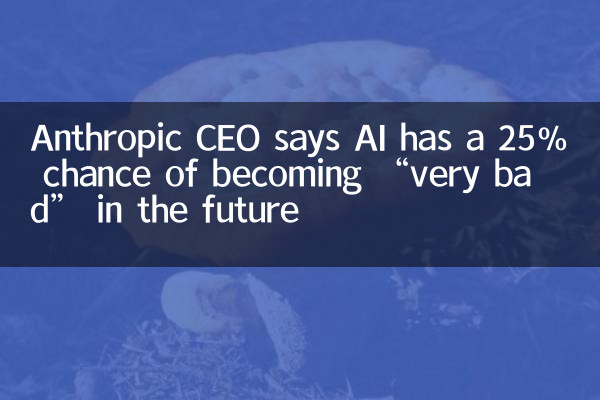Anthropic CEO says AI has a 25% chance of becoming “very bad” in the future
Recently, Anthropic CEO Dario Amodei made a stunning point in a public speech: there is a 25% chance that artificial intelligence will become "very bad" in the future. This remark quickly sparked widespread discussions in the global technology community and the public, and became one of the hot topics in the past 10 days. The following is the structured data analysis and extensions surrounding this view.
1. Core viewpoint and background

As an authoritative figure in the field of AI security, Dario Amodei emphasized that the rapid development of current AI technology may bring uncontrollable risks. He proposed the following key data:
| Possibility classification | Probability | Potential impact |
|---|---|---|
| AI development brings great benefits | 50% | Solve global issues such as climate change and diseases |
| AI development neutral | 25% | Maintaining the status quo without significantly changing the social structure |
| AI becomes "very bad" | 25% | Out of control, abuse or irreversible harm |
2. Top 5 hot topics on the entire network (next 10 days)
| Ranking | topic | Discussion volume (10,000) | Main Platforms |
|---|---|---|---|
| 1 | AI security and ethical disputes | 1200+ | Twitter/Zhihu |
| 2 | AI regulatory policy trends in various countries | 890 | LinkedIn/Weibo |
| 3 | ChatGPT-5 latest progress | 760 | Reddit/Post Bar |
| 4 | AI replaces human jobs | 680 | Maimai/Works Forum |
| 5 | Concerns about the military application of AI | 550 | Professional media/think tank |
3. Polarization of expert views
Regarding Dario Amodei's predictions, there are obvious differences between the academic and industry:
| Supporting representative | Core argument | Opposing representative | Refute opinions |
|---|---|---|---|
| Eliezer Yudkowsky (Mechanical Intelligence Research Institute) | AI alignment problem has not been resolved, and the risk of out-of-control is underestimated | Andrew Ng (Deep Learning Expert) | Excessive concerns can hinder technological innovation |
| Stuart Russell (UC Berkeley) | Existing AI systems have shown unexplainable features | Yann LeCun (Meta Chief AI Scientist) | There is no empirical basis for probability estimates |
4. Public sentiment analysis
According to social media sentiment analysis tools, the public's perception of AI risks is as follows:
| Emotion Type | Percentage | Typical comments |
|---|---|---|
| Strong concern | 32% | "All AGI R&D should be suspended immediately" |
| Cautiously optimistic | 41% | "International regulatory framework is needed" |
| Totally optimistic | 18% | "Technical problems will eventually be solved" |
| indifferent | 9% | "It's still far from real life" |
5. Current situation of industry response measures
Comparison of major technology companies' investment in the field of AI security:
| company | Security team size | Annual Budget (USD 100 million) | Core Measures |
|---|---|---|---|
| Anthropic | 120+ people | 2.8 | Constitutional AI framework development |
| OpenAI | 90 people | 2.0 | Red team testing mechanism |
| DeepMind | 75 people | 1.5 | Value alignment research |
| Meta | 60 people | 1.2 | Open source review system |
Conclusion: AI civilization at the intersection
Dario Amodei's warning sounds the alarm for the rapidly growing AI industry. Although the probability of a 25% "very bad" is not high, this number is enough to attract global attention given the severity of the potential impact. Finding a balance between technological innovation and risk prevention and control will become the key to determining whether humans can safely enter the AI era. As one critic said, "We are not predicting the future, but choosing the future - through today's decisions and actions."
It is worth noting that the recent passage of the EU AI bill and the launch of the Sino-US AI security dialogue show that the international community has begun to work together to respond to this challenge. The next 12 months are regarded by the industry as a "key window period" for AI governance, and related progress deserves continued attention.

check the details

check the details